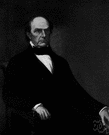Webster
Also found in: Thesaurus, Medical, Encyclopedia, Wikipedia.
Related to Webster: John Webster
web·ster
(wĕb′stər)n. Archaic
A weaver of cloth.
[Middle English, from Old English webbestre, feminine of webba, weaver, from webb, web; see webh- in Indo-European roots.]
American Heritage® Dictionary of the English Language, Fifth Edition. Copyright © 2016 by Houghton Mifflin Harcourt Publishing Company. Published by Houghton Mifflin Harcourt Publishing Company. All rights reserved.
webster
(ˈwɛbstə)n
(Textiles) an archaic word for weaver1
[Old English webbestre, from webba a weaver, from webb web]
Webster
(ˈwɛbstə)n
1. (Biography) Daniel. 1782–1852, US politician and orator
2. (Biography) John. ?1580–?1625, English dramatist, noted for his revenge tragedies The White Devil (?1612) and The Duchess of Malfi (?1613)
3. (Biography) Noah. 1758–1843, US lexicographer, famous for his American Dictionary of the English Language (1828)
Collins English Dictionary – Complete and Unabridged, 12th Edition 2014 © HarperCollins Publishers 1991, 1994, 1998, 2000, 2003, 2006, 2007, 2009, 2011, 2014
web•ster
(ˈwɛb stər)n. Archaic.
a weaver.
[before 1100]
Web•ster
(ˈwɛb stər)n.
1. Daniel, 1782–1852, U.S. statesman and orator.
2. John, c1580–1625?, English playwright.
3. Noah, 1758–1843, U.S. lexicographer and essayist.
4. Informal. Also, Web′ster's. a dictionary of the English language.
Web•ste′ri•an (-ˈstɪər i ən) adj.
Random House Kernerman Webster's College Dictionary, © 2010 K Dictionaries Ltd. Copyright 2005, 1997, 1991 by Random House, Inc. All rights reserved.
ThesaurusAntonymsRelated WordsSynonymsLegend:
Switch to new thesaurus
| Noun | 1. |  Webster - English playwright (1580-1625) Webster - English playwright (1580-1625) |
| 2. |  Webster - United States politician and orator (1782-1817) Webster - United States politician and orator (1782-1817) | |
| 3. |  Webster - United States lexicographer (1758-1843) Webster - United States lexicographer (1758-1843) |
Based on WordNet 3.0, Farlex clipart collection. © 2003-2012 Princeton University, Farlex Inc.